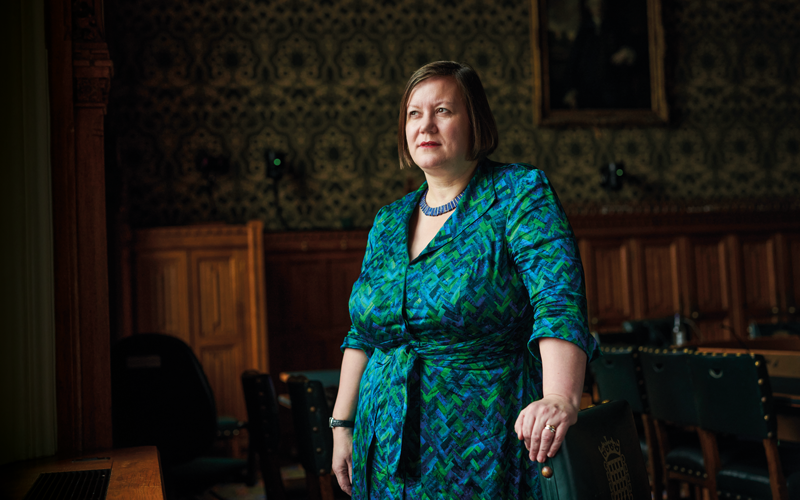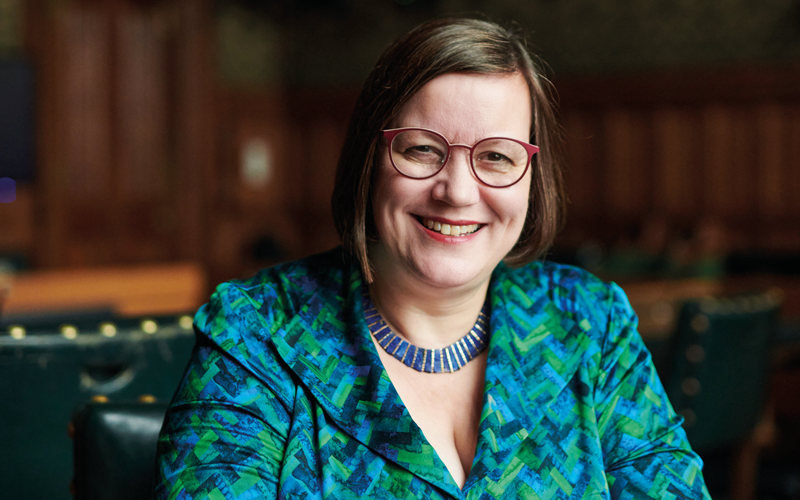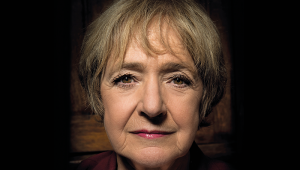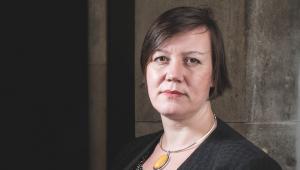
Where’s the best viewpoint to really understand big events as they happen? According to former Conservative minister and journalist Lord Bill Deedes, it’s not in the middle of the action.
He used a football metaphor and advised that the best place to understand a match wasn’t the director’s box but next to the physio, close to the touchline.
The Public Accounts Committee arguably has the best seat in the House to understand the reality of UK government – from global defence decisions to parish council delivery.
And the chair of the committee since 2015 is another journalist-turned-politician, Dame Meg Hillier (Lab).
She’s quizzed successive ministers from multiple departments, challenged officials and taken evidence on issues from government finances to digital transformation.
And with a general election in sight, change is coming. The next administration will have a hugely challenging in-tray. So, the perspective of a former local authority councillor, Greater London Authority member and government minister is hugely useful.
There’s been a lot to consider, such as the impact of the 49-day Liz Truss administration.
Hillier reflects: “We’ve had the most turbulent time. Who’d have predicted in 2015 that what was to come would make the coalition feel stable? We’ve had Brexit, Covid and, from the start of the coalition, five prime ministers.”
The PAC role is unique, as the committee works with the National Audit Office.
Hillier shares ideas for reports but doesn’t go further, unlike her predecessor, Margaret Hodge, who took a more hands-on approach, even wanting to lead on reports.
She has the respect of the sector. A council finance director tells PF: “I don’t think she achieved all she could have as a minister. That’s often circumstances. But as PAC chair, she’s been outstanding.”
We’re in the PAC chair’s office in parliament at a table that, legend has it, was first used by Harold Wilson. Photos of previous chairs literally look down on the proceedings. They were recently saved from a water leak that destroyed part of the office. It’s perhaps a metaphor for the past four years.
Short and long
What Hillier likes is that the PAC can focus on what she calls ‘slow politics’, unlike other committees.
She says: “We’re regularly looking 10, 20 or 30 years ahead, otherwise you get distracted by numbers. Defence is a microcosm of the PAC work: 40-year delays, aircraft carriers without aircraft and so on. We haven’t decommissioned a single nuclear submarine in the UK. That’s been put off. We’ll ask why.”
Crumbling concrete in schools is another demonstration of both the issues covered and the power of the committee, as it was the National Audit Office’s report, reviewed by the committee, that escalated the scandal.
Hillier says: “It’s a ‘state’ failure, so the state must fix it.”
There are also ‘slow’ issues, such as HS2, which affects her constituents. The project hasn’t finished causing problems.
“It’s very expensive to stop something. Land purchase takes 10 or 20 years. We should have started from Scotland and worked our way down. In Camden, we’ve got this huge hole in the ground, and there are smaller contractors that had 80% of their work in Euston. It’s heartbreaking.”
Hillier adds: “Who’s going to take over someone’s half-finished project?”
There are new dimensions to old problems, too, such as retaining NHS and social care staff – and even police officers.
“There’s a trend that some people are not even buying into their NHS pensions, because they can’t do that and pay rent as well,” warns Hillier. “They aren’t planning on staying. We need to be looking at that more.”
She adds concern about a wider problem: “You can’t save for a pension just in the final decade before you retire.”
CV

Education and early career
Oxford University, philosophy, politics and economics degree
Journalist in regional press and social housing
1994-2002 Councillor, Islington
1998 Mayor of Islington
2000 Member of the London Assembly and board member of Transport for London
2005 MP, Hackney South and Shoreditch
2007 Home Office minister
2015 PAC committee chair
2021 Appointed dame for political and parliamentary service
Yes, minister
Having been a minister, she is alarmed by the churn in junior government posts.
“The engine room of government is made up of the ministers of state. They do the heavy lifting. If they move or resign, you’ve got a problem – not least, civil servants having to repeat themselves so often.”
An issue that has evolved is the impact of devolution.
“We’re increasingly looking through cohesion issues – either regional and central or cross-cutting. The two Andys – the metro mayors of Manchester and Birmingham – both have a vision for their areas. Quite often, the money is best spent locally. I’m a great believer in devolution – it’s about empowering people where they are,” says Hillier.
Empowerment could also include joint funding across Whitehall: “You could have six departments bid for money together. It’s very rare. They say they will do this, but just look at the Home Office and the pressure it’s under.”
Rethinking IT project approaches would also help.
“Even 1% of a budget has an impact on the day-to-day resources. Pushing things back to manage within year is a problem. You have to have tight oversight, yes, but we don’t think about that impact – mostly, you can’t spend it that fast. The Treasury is having to run a cash-in, cash-out economy.”
An innovation she has been pushing for is a head of risk in the civil service, placed in the Cabinet Office.
“You have a similar role in a bank – you can’t operate without that position. They can see where the vulnerabilities are. The prime minister of the day will obviously make the decision, but they need that clear advice.”
But the committee is concerned about the experience of senior civil servants – especially in the Treasury, which was hit hard by the sacking of permanent secretary Tom Scholar in the Truss era.
“It’s a real problem for us. There are excellent, keen and capable civil servants. But we are genuinely terrified when people giving evidence say, ‘I’ve read the report’.” How do you keep that long-term thinking and experience? There are now permanent secretaries on five-year terms.
“There’s an expert on government borrowing who has been in post for 20 years. Who else is going to give 20 years to government borrowing? It’s a very tricky area.”
Future-proof
Data and developing IT systems is another tricky issue – a “vital but boring” task.
“There’s some things like the digital strategy that have to happen, but we don’t put this on top of existing services. There are 10-year projects with three years of funding,” she says.
“Think of Iain Duncan Smith and universal credit. He’d thought about it in opposition, but had a five-year delivery for a 20-year programme. When you start something, you need to see it through properly.”
Data matters for ministers: “You can quickly get to the heart of an issue if you can show how to read it. When I was working with the Passport Office, the banking crisis had stopped people going on holiday. We knew there would be a surge in demand later, and we had a plan because we had the data to prove it.”
Local difficulty
The Section 114 crisis is going to result in services being cut. Whitehall hasn’t seen a problem coming, ex-councillor Hillier says.
“Whatever government comes next, they are going to come in and expect local government to deliver its agenda, but whatever services they had before now won’t be there, so they won’t have the capacity to deliver.”
She adds: “When they’re just having to deliver the basics, it’s a big risk. A lot of councillors are finally beginning to ask why they haven’t had accounts for two years. That’s terrible.”
What’s her lesson from having been in power?
“There are not many quick wins in government. The private finance initiative delivered in the day but left problems for later.”
She adds: “One of the things that makes me cross is the capital/revenue issue. Take the 32 new hospitals pledge. We’re going to have a lot of big construction happening in the late 2020s-30s.”
But there’s a deeper issue of trust, especially after Partygate, that’s also a future concern.
Hillier says: “You should never celebrate when ‘the other lot’ are having problems. As far as voters are concerned, it’s a plague upon all your houses.”

Question time
Career advice
For a new MP, minister, councillor or PAC member:
“There’s no such thing as a stupid question. Ask ‘How will this work when it lands with my constituents?’ It’s when a constituent hits two problems that the vortex of issues kicks in.
“As a minister, you have the privilege of working with amazing experts who know about everything in their area. Our job is to cut across that. It’s what politicians should bring to the picture.
“Being a politician is a marathon, not a sprint. Don’t sweat the small stuff. You’ve got to be clear and sometimes tell the uncomfortable truths, as well as engage with people – and not be afraid to be tested.”
Election plans
The immediate future has a general election coming, and, although most manifesto plans were finished in December, there is still a ‘policy loop’ going on.
Hillier says the parties should heed voters: “We just need to see a proper, clear plan.”
But if we could have just one thing in the manifestos?
“Mental health issues in schools are a big concern. Nurses are being provided by some local authorities. It’s preventative working that works. I wonder where local government is going to get the money from,” she says.
And what if we could change one thing?
“I’m hoping that we have the courage to think long-term, whichever party forms the next government. What I’m sad about is housing. Even those who have got good jobs are struggling to rent. There are health issues, people trapped with domestic violence and more. We need a 20-year programme to fix this. We’ve endangered a whole generation.”
One certainty is that she won’t be chair of the committee in the next term. And there’s a strong likelihood of a return to government. She has ministerial experience and has been advising Starmer’s team.
But Hillier very firmly bats away speculation. “Being a minister means the trajectory can suddenly go up and suddenly drop off. That’s in the hands of others,” she says.
“Most people here just want to serve. There are other ways of getting glory. I’m a great believer in pavement politics. I’m proud to serve my constituents. That’s why I’m here.”




















